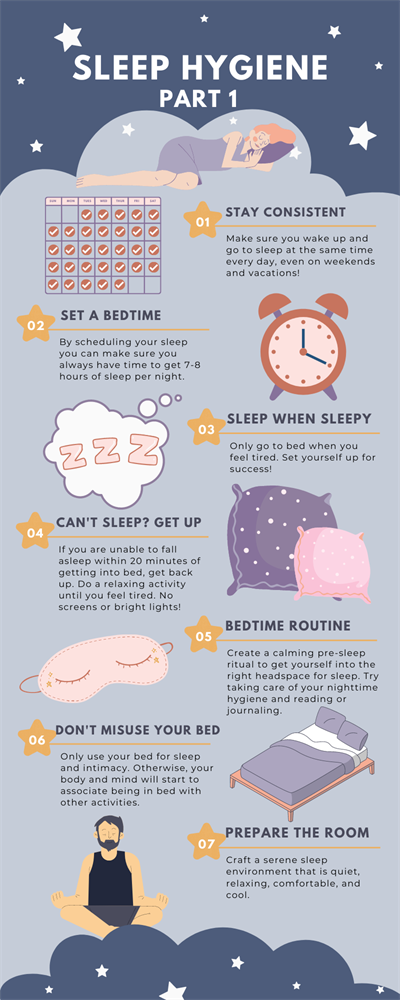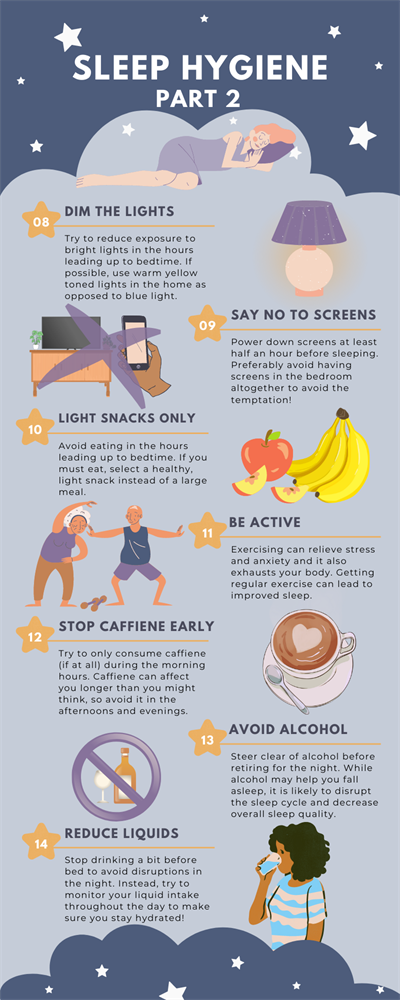Mastering Sleep Hygiene: 14 Essential Practices for Quality Rest

Sleep is a fundamental pillar of well-being that significantly impacts our physical and mental health. To achieve restorative sleep and wake up feeling refreshed, practicing proper sleep hygiene is essential. In this blog post, we'll delve into 14 crucial sleep hygiene practices, sourced from the reputable American Academy of Sleep Medicine (AASM), that can help you establish healthy sleep habits and optimize your sleep quality.
Incorporating these 14 sleep hygiene practices into your routine can have a transformative impact on the quality of your sleep. By following these guidelines sourced from the American Academy of Sleep Medicine, you'll pave the way for restful nights, improved well-being, and enhanced productivity during the day. Prioritize sleep hygiene, and watch as your sleep becomes a revitalizing and rejuvenating experience.
This list of sleep hygiene practices originated from the American Academy of Sleep Medicine and can be found here: https://sleepeducation.org/healthy-sleep/healthy-sleep-habits/
For more information on healthy sleep habits and other sleep related topics, please visit the American Academy of Sleep Medicine’s website at https://sleepeducation.org/


Disclaimer: The information provided in this article is for educational purposes only and should not replace professional medical advice. The content is not intended to be a substitute for professional diagnosis, treatment, or care. Always seek the advice of a qualified healthcare provider with any questions you may have regarding medications or any medical condition.
Affiliated Medical Group providers are available to provide personalized guidance and recommendations based on your specific needs. If you require further assistance or wish to schedule an appointment, please call (910) 939-0724 to consult with one of our experienced healthcare professionals. Your mental health and well-being are our top priorities, and we are here to support you on your journey toward better mental health.
Maintain a Consistent Sleep Schedule
Align your body's internal clock by waking up and going to bed at the same times each day, even on weekends and vacations. This consistency helps regulate your sleep-wake cycle.Set an Appropriate Bedtime
Set aside time for 7-8 hours of sleep each night by selecting a bedtime that allows you to achieve this duration. Prioritize this practice to meet your sleep needs.Listen to Your Body
Go to bed only when you genuinely feel sleepy. Trying to force sleep can lead to frustration and anxiety, making it harder to fall asleep. It can also confuse your mind and body into thinking your bed is for things other than sleep.Implement the 20-Minute Rule
If you can't fall asleep within 20 minutes, get out of bed and engage in a calm, lights-free and screens-free activity. This approach prevents the bed from becoming associated with wakefulness.Create a Relaxing Pre-Sleep Routine
Wind down before bed by engaging in calming activities like reading, journaling, gentle stretching, or practicing deep breathing. Over time this routine will begin to signal to your body that it's time to unwind.Designate Your Bed for Sleep and Intimacy
Reserve your bed exclusively for sleep and intimate activities. This practice strengthens the connection between your bed and relaxation, contributing to a restful atmosphere. When you engage in other activities such as watching TV, browsing your phone, or working on your laptop in bed, you unintentionally associate the bed with wakefulness. Over time, this association can impede your ability to swiftly unwind and easily fall asleep each night.Curate a Tranquil Sleep Environment
Foster a peaceful sleep sanctuary by upholding a comfortable room temperature, reducing noise disturbances, and keeping your bedroom free from clutter. Consider the soothing influence of relaxing scents and the potential benefits of incorporating aromatherapy into your bedroom ambiance.Diminish Evening Light Exposure
Reduce exposure to bright artificial lights before bedtime, as light exposure can interfere with the production of the sleep-inducing hormone melatonin.Disconnect from Electronics
Power down electronic devices at least 30 minutes before sleeping. The blue light emitted by screens can disrupt your body's natural sleep signals.Mind Your Evening Eating
Aim to enjoy your meals earlier in the day so you can stop eating at least one to two hours before bedtime. Should hunger strike closer to bedtime, choose a light and healthy snack instead of a large meal to avoid discomfort. Steer clear of heavy or spicy meals that may trigger indigestion and disrupt your sleep.Prioritize Physical Activity
Incorporating consistent physical activity into your routine can effectively alleviate anxiety and stress while promoting quicker sleep onset by helping tire the body. However, you may want to avoid intense workouts close to bedtime, as they can rev up your energy levels and delay sleep.Mind Your Caffeine Intake
Limit caffeine consumption, especially in the afternoon and evening, as it can interfere with falling asleep and disrupt your sleep cycles.Moderate Alcohol Consumption
Refrain from consuming alcohol near bedtime. While it may induce drowsiness initially, it can lead to fragmented sleep and decreased sleep quality.Control Fluid Intake Before Bed
Minimize liquid consumption in the hours leading up to sleep to prevent nighttime awakenings for trips to the bathroom.Incorporating these 14 sleep hygiene practices into your routine can have a transformative impact on the quality of your sleep. By following these guidelines sourced from the American Academy of Sleep Medicine, you'll pave the way for restful nights, improved well-being, and enhanced productivity during the day. Prioritize sleep hygiene, and watch as your sleep becomes a revitalizing and rejuvenating experience.
This list of sleep hygiene practices originated from the American Academy of Sleep Medicine and can be found here: https://sleepeducation.org/
For more information on healthy sleep habits and other sleep related topics, please visit the American Academy of Sleep Medicine’s website at https://sleepeducation.org/


Disclaimer: The information provided in this article is for educational purposes only and should not replace professional medical advice. The content is not intended to be a substitute for professional diagnosis, treatment, or care. Always seek the advice of a qualified healthcare provider with any questions you may have regarding medications or any medical condition.
Affiliated Medical Group providers are available to provide personalized guidance and recommendations based on your specific needs. If you require further assistance or wish to schedule an appointment, please call (910) 939-0724 to consult with one of our experienced healthcare professionals. Your mental health and well-being are our top priorities, and we are here to support you on your journey toward better mental health.
